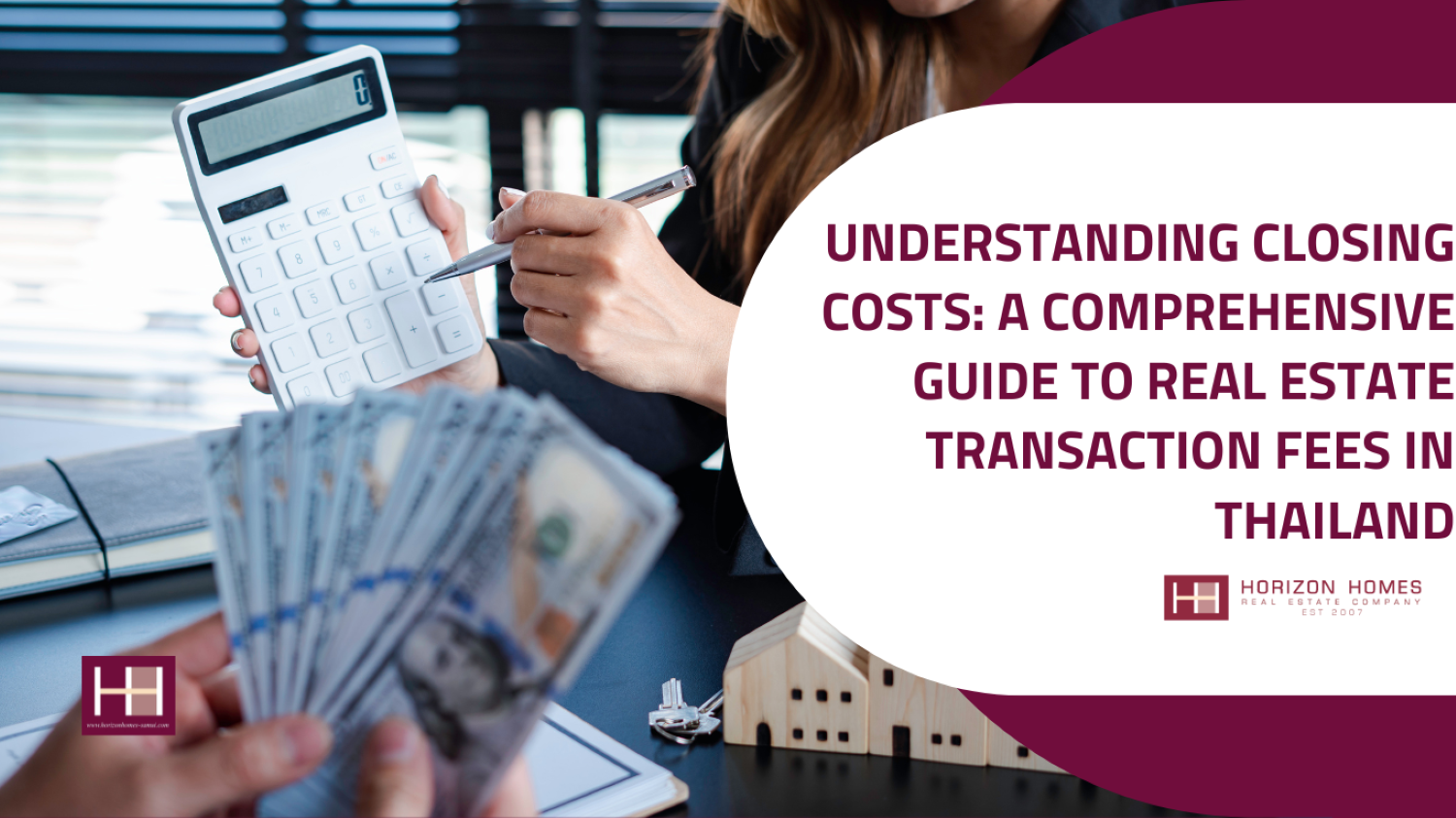Demystifying Closing Costs in Real Estate
When venturing into the world of real estate in Thailand, one crucial aspect that often leads to confusion is closing costs. These are the fees and expenses paid at the end of a real estate transaction, and understanding them is vital for both buyers and sellers. This article aims to clarify what closing costs entail, who is responsible for them, and provide a detailed breakdown of the common fees encountered during a real estate transaction in Thailand.
The Basics of Closing Costs
Closing costs refer to the various fees and expenses associated with the purchase and sale of real estate. In Thailand, these costs can include a range of fees that must be settled before the transfer of property ownership is finalized. Typically, both the buyer and seller will incur different closing costs, and understanding who pays for what is essential in planning your budget.
Why Are Closing Costs Important?
Closing costs can significantly impact the overall financial plan for both buyers and sellers. For buyers, these costs can add thousands of baht to the total expense of purchasing a property, while sellers need to factor in these costs when determining their net proceeds from the sale. It is crucial to account for these expenses to avoid any surprises during the closing process.
Breakdown of Common Closing Costs
Category | Type of Fee | Typical Range (Baht) | Notes |
Loan-Related Fees | Loan Origination Fees | 1% to 2% of loan amount | Charged for processing the loan application. |
Credit Report Fees | 500 to 2,000 | Charged for obtaining the buyer’s credit history. | |
Appraisal Fees | 3,000 to 10,000 | Charged to determine the property’s value. | |
Title and Escrow Fees | Title Search Fees | 1,000 to 3,000 | Verifies the property’s legal ownership history. |
Title Insurance | Varies | Optional, protects against ownership disputes. | |
Escrow Fees | 1,000 to 5,000 | Charged for managing transaction funds. | |
Government Fees | Recording Fees | 0.01% to 0.1% of sale price | Cost for registering the sale with the Land Department. |
Transfer Taxes | 2% of appraised value or sale price | Charged on the higher of the two values. | |
Prepaid Items | Property Taxes | Varies | Prorated based on closing date. |
Homeowners Insurance | Varies | Often the first year’s premium is due at closing. | |
Interest | Varies | Covers interest from closing date to first mortgage payment. | |
Additional Costs | Home Inspection Fees | 3,000 to 10,000 | Optional but recommended for identifying property issues. |
Survey Fees | 3,000 to 10,000 | If necessary, confirms property boundaries. | |
Attorney Fees | 5,000 to 15,000 | Optional, for legal representation. |
Loan-Related Fees
- Loan Origination Fees: If a buyer is financing their property, lenders may charge a loan origination fee for processing the loan application. In Thailand, this fee can vary but typically ranges from 1% to 2% of the loan amount.
- Credit Report Fees: Lenders will often charge a fee to obtain the buyer’s credit history, which can range from 500 to 2,000 baht.
- Appraisal Fees: An appraisal is required to determine the property’s value and is typically charged by the lender. This fee can vary but generally ranges from 3,000 to 10,000 baht.
Title and Escrow Charges
- Title Search Fees: A title search is conducted to verify the property’s legal ownership history. In Thailand, this fee can range from 1,000 to 3,000 baht.
- Title Insurance: While not common in Thailand, some buyers may choose to purchase title insurance to protect against potential disputes. This fee can vary widely.
- Escrow Fees: Escrow services may be used to manage the funds during the transaction, with fees typically ranging from 1,000 to 5,000 baht depending on the complexity of the deal.
Government Fees
- Recording Fees: The cost of registering the sale with the Land Department is typically around 0.01% to 0.1% of the sale price.
- Transfer Taxes: In Thailand, the transfer tax is generally 2% of the appraised value of the property or the sale price, whichever is higher.
Prepaid Items
- Property Taxes: Buyers may need to pay property taxes that are prorated based on the closing date. These taxes can vary depending on the property’s location and value.
- Homeowners Insurance: While not always required, buyers may be advised to obtain homeowners insurance, with the first year’s premium often due at closing.
- Interest: Buyers may need to pay prepaid interest on the mortgage from the date of closing until their first payment, which can vary based on the loan terms.
Additional Closing Costs
- Home Inspection Fees: Buyers often choose to have a property inspection conducted to identify any potential issues. This fee typically ranges from 3,000 to 10,000 baht.
- Survey Fees: If a survey is necessary to confirm property boundaries, this fee can range from 3,000 to 10,000 baht.
- Attorney Fees: While not mandatory, hiring a lawyer for legal representation during the closing process can add to the costs, typically ranging from 5,000 to 15,000 baht.
Navigating Closing Costs in Real Life
Estimating closing costs can be daunting, but various tools and calculators are available online to assist buyers and sellers. Additionally, the Good Faith Estimate (GFE) provided by lenders can help forecast expenses and give a clearer picture of what to expect at closing.
Tips for Reducing Closing Costs
Negotiating fees with lenders or sellers can often lead to savings. Understanding which costs are fixed and which are variable can also help buyers and sellers identify areas where they may be able to negotiate or reduce expenses.
Closing Cost Assistance Programs
In Thailand, while formal assistance programs for closing costs are limited, some developers may offer incentives or seller concessions that help cover a portion of the buyer’s closing costs.
Preparing for Your Real Estate Closing
To ensure a smooth closing, buyers and sellers should prepare a checklist of necessary documents and items to bring to the closing. It’s also essential to conduct a final walkthrough of the property to ensure that everything is in order before finalizing the sale.
Reviewing and Understanding the Closing Disclosure
Understanding the Closing Disclosure form is crucial. This document outlines all closing costs and fees, and it’s important to review it in advance to address any discrepancies or concerns before the closing day.
Conclusion
Closing costs are an integral part of real estate transactions in Thailand. By understanding and preparing for these expenses, buyers and sellers can approach closing day with greater confidence and peace of mind. Whether you’re purchasing through a reputable developer like Horizon Homes or navigating the process independently, consulting with real estate professionals—such as agents, attorneys, and lenders—is essential to ensure a smooth and transparent closing process. With the right information and preparation, navigating closing costs can become a straightforward and manageable part of your real estate journey.
FAQs: Understanding Closing Costs in Thailand
Closing costs are fees and expenses incurred during the purchase or sale of a property. These can include loan-related fees, title and escrow charges, government fees, prepaid items, and additional costs.
Both buyers and sellers share the responsibility, but the exact distribution depends on the terms negotiated in the sales agreement. Typically, sellers pay the transfer tax, while buyers cover loan and appraisal-related fees.
Yes, some closing costs are negotiable, such as lender fees or attorney fees. Buyers and sellers can discuss these costs during the negotiation phase.
You can use online calculators or consult your lender for a Good Faith Estimate (GFE), which provides a detailed breakdown of expected costs. It’s always advisable to set aside an additional budget to account for unexpected fees.
Formal assistance programs are limited in Thailand, but some developers offer incentives, such as covering part of the buyer’s closing costs, as part of promotional campaigns.
The Closing Disclosure provides a detailed summary of all fees and costs involved in the transaction. Reviewing it helps ensure accuracy and avoid any last-minute discrepancies.


